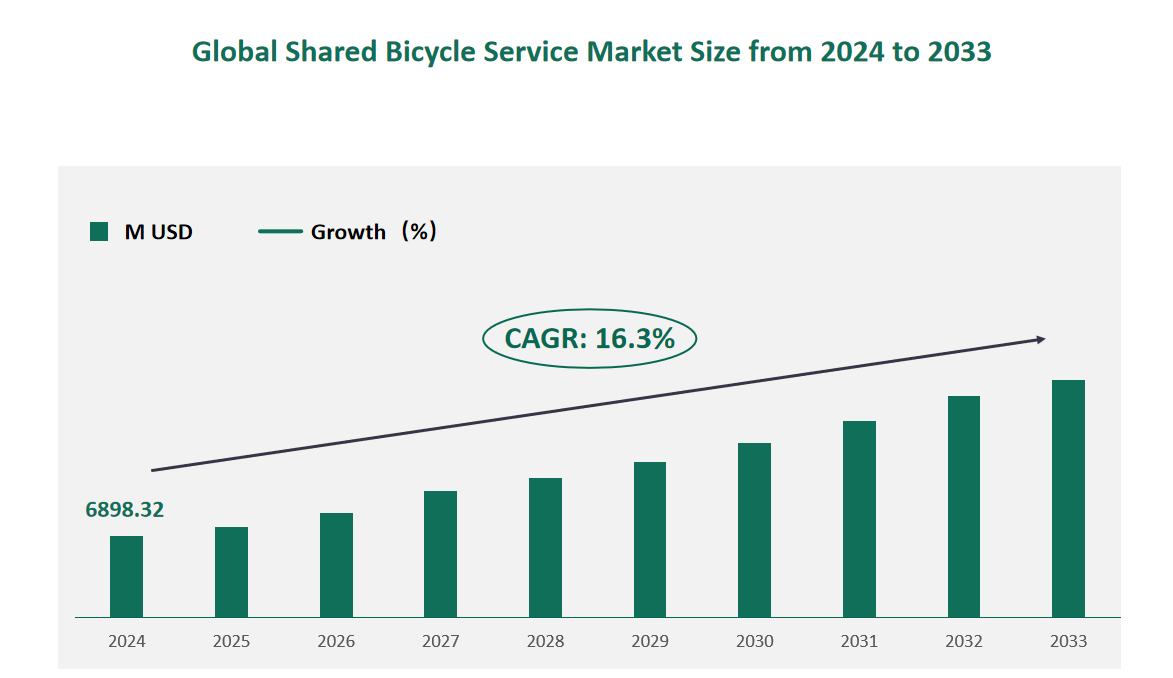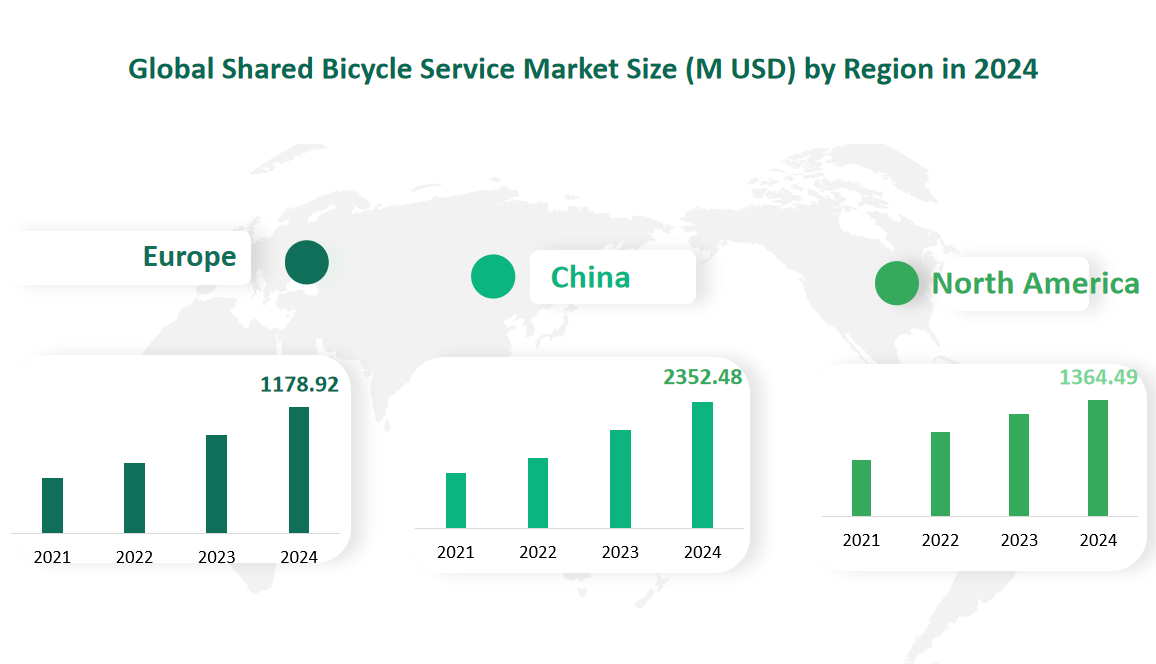1 Global Shared Bicycle Service Market Size (Value) and CAGR (2024-2033)
In 2024, the global Shared Bicycle Service market was valued at USD 6898.32 million, with a CAGR of 16.3% from 2024 to 2033.
Shared Bicycle Service refers to a system where bicycles are made available for shared use to individuals on a short-term basis. These services are typically provided by companies or organizations that manage a fleet of bicycles, which can be accessed through various means such as mobile applications or docking stations. The primary purpose of these services is to offer an affordable, convenient, and environmentally friendly transportation option for short trips within urban areas. This not only reduces traffic congestion but also lowers carbon emissions, making it a sustainable solution for modern cities.
Figure Global Shared Bicycle Service Market Size (M USD) and CAGR 2024-2033

2 Shared Bicycle Service Market Drivers
One of the primary drivers of the Shared Bicycle Service market is the growing global concern for environmental sustainability and health. As urbanization accelerates, cities face increasing challenges related to air pollution, traffic congestion, and carbon emissions. Shared bicycles offer a zero-emission alternative to traditional motor vehicles, making them an attractive solution for reducing pollution and promoting a healthier environment. Additionally, cycling is a form of physical exercise that contributes to better public health, further encouraging the adoption of shared bicycle services.
Shared bicycles provide an extremely cost-effective mode of transportation, especially for short-distance travel. Users can access bicycles at a fraction of the cost of owning a private vehicle or using public transport. The convenience of having bicycles available 24/7, combined with the flexibility of docking them at various locations, makes shared bicycles an ideal solution for the “last mile” of daily commutes. This cost and time efficiency has made shared bicycles increasingly popular among urban residents.
Technological innovations have played a crucial role in the growth of the Shared Bicycle Service market. The integration of GPS tracking, mobile applications, and IoT (Internet of Things) has enhanced the user experience and operational efficiency of shared bicycle services. Users can easily locate and unlock bicycles through mobile apps, while service providers can monitor and manage their fleets in real-time. These advancements have not only improved the reliability and accessibility of shared bicycles but also reduced operational costs.
3 Shared Bicycle Service Market Restraints
One of the most significant challenges facing shared bicycle services is the issue of vandalism and theft. Bicycles are often left unattended in public spaces, making them vulnerable to damage and theft. High rates of vandalism and theft not only increase operational costs but also reduce the availability of bicycles for users. For example, Mobike had to withdraw from Manchester due to significant losses caused by theft and vandalism. Addressing this challenge requires robust security measures and public awareness campaigns to protect shared bicycles.
The operational and maintenance costs associated with shared bicycle services are substantial. Bicycles have a limited lifespan, typically around three years, and require regular maintenance to ensure they are in good working condition. The high frequency of use and exposure to various weather conditions further shorten their lifespan. Additionally, the wide geographic coverage of shared bicycle services means that companies need to invest heavily in personnel and resources for maintenance and redistribution. These costs can strain the financial viability of service providers.
4 Global Shared Bicycle Service Market Size and Share by Type in 2024
In 2024, the With Dock segment accounted for a larger share of the market, with a value of 3986.54 million USD. This segment’s dominance can be attributed to its widespread adoption in major cities across North America, Europe, and Asia. The stability and reliability of docking stations make them a preferred choice for many municipalities and service providers. Additionally, the integration of docking stations with existing public transportation systems enhances their utility and accessibility.
Conversely, the Dockless segment, valued at 2911.78 million USD in 2024, represents a rapidly growing segment of the market. Its appeal lies in the flexibility and convenience it offers to users. Dockless systems have gained significant traction in cities with high population density and limited space for docking stations. The ability to leave bicycles at any location reduces the hassle associated with finding a docking station, making dockless bicycles particularly attractive for short trips and spontaneous use.
Table Global Shared Bicycle Service Market Size and Share by Type in 2024
Type | Market Size (M USD) 2024 | Market Share 2024 |
With Dock | 3986.54 | 57.79% |
Dockless | 2911.78 | 42.21% |
5 Global Shared Bicycle Service Market Size and Share by Application in 2024
In terms of market size, the Personal User segment accounted for 4200.39 million USD in 2024, representing the majority of the market share. This segment includes individuals who use shared bicycles for daily commuting, short trips, and recreational purposes. The popularity of shared bicycles among personal users can be attributed to their convenience, cost-effectiveness, and environmental benefits. Personal users often choose shared bicycles to avoid traffic congestion, reduce transportation costs, and contribute to a healthier lifestyle.
The Business User segment, valued at 2697.93 million USD in 2024, includes enterprises and organizations that utilize shared bicycles for various business-related activities. This segment is driven by companies seeking sustainable and efficient transportation options for their employees, as well as businesses that integrate shared bicycles into their logistics and delivery operations. The use of shared bicycles in corporate settings not only reduces carbon emissions but also enhances employee productivity and satisfaction.
Table Global Shared Bicycle Service Market Size and Share by Application in 2024
Application | Market Size (M USD) 2024 | Market Share 2024 |
Personal User | 4200.39 | 60.89% |
Business User | 2697.93 | 39.11% |
6 Global Shared Bicycle Service Market Size by Region in 2024
China emerged as the largest market for Shared Bicycle Service in 2024, with a significant market size of 2352.48 million USD. The rapid urbanization and government support for green transportation initiatives have fueled the growth of shared bicycle services in China. The country has seen widespread adoption of both docked and dockless systems, with major players like Mobike and Hellobike dominating the market. The Chinese government’s investment in cycling infrastructure and promotion of shared mobility solutions have further contributed to the expansion of this segment.
North America and Europe also represent substantial markets, with North America valued at 1364.49 million USD and Europe at 1178.92 million USD in 2024. These regions have seen increasing adoption of shared bicycle services, driven by environmental awareness and the need for sustainable urban transportation solutions. Cities like New York, San Francisco, London, and Paris have implemented extensive shared bicycle programs, integrating them with existing public transportation networks. The growth in these regions is supported by government policies promoting cycling and investments in infrastructure.
Figure Global Shared Bicycle Service Market Size by Region in 2024

7 Major Players in Global Shared Bicycle Service Market
7.1 Mobike
Company Profile and Business Overview
Mobike is a leading provider of shared bicycle services, established in 2015 with its primary operations based in China. The company has rapidly expanded its services to over 200 cities worldwide, positioning itself as a key player in the global market. Mobike’s business model focuses on offering affordable, convenient, and eco-friendly transportation solutions to reduce urban traffic congestion and carbon emissions. The company’s success is driven by its innovative technology, user-friendly mobile application, and strategic partnerships with local governments and organizations.
Shared Bicycle Service Introduction
Mobike’s shared bicycle service is designed to provide a seamless and efficient transportation experience. Users can easily locate, unlock, and ride bicycles through the Mobike app, which also allows for real-time tracking and payment processing. The company’s bicycles are equipped with advanced features such as GPS tracking, smart locks, and durable designs to ensure reliability and user safety. Mobike’s commitment to sustainability and technological innovation has made it a preferred choice for urban commuters and environmentally conscious consumers.
Recent Financial Performance
In the most recent year, Mobike reported a revenue of 411.47 million USD, with a gross profit of 186.35 million USD.
7.2 Hellobike
Company Profile and Business Overview
Hellobike, established in 2016, is another major player in the shared bicycle service market, primarily operating in China. The company has quickly gained popularity due to its user-friendly platform and extensive network of bicycles available in over 460 cities. Hellobike’s business model emphasizes convenience, accessibility, and technological innovation, aiming to provide a reliable transportation option for short-distance travel. The company’s success is driven by its strong user base, strategic partnerships, and commitment to improving urban mobility.
Shared Bicycle Service Introduction
Hellobike’s service is designed to offer a flexible and convenient transportation solution for urban residents. Users can access bicycles through the Hellobike app, which provides real-time information on available bikes and their locations. The company’s bicycles are known for their durability, ease of use, and advanced features such as smart locks and GPS tracking. Hellobike’s commitment to user experience and technological advancement has helped it establish a strong presence in the market.
Recent Financial Performance
In the most recent year, Hellobike reported a revenue of 405.81 million USD, with a gross profit of 175.51 million USD.
7.3 Neutron Holdings, Inc.
Company Profile and Business Overview
Neutron Holdings, Inc., established in 2017, operates under the brand name Lime and is a major player in the shared bicycle and scooter service market, primarily based in the United States. The company’s business model focuses on providing affordable, eco-friendly transportation options to reduce urban congestion and promote sustainable mobility. Neutron Holdings, Inc. has expanded its services globally, integrating advanced technology and user-friendly applications to enhance the overall user experience.
Shared Bicycle Service Introduction
Neutron Holdings, Inc.’s shared bicycle service, known as Lime, offers a range of eco-friendly transportation options, including bicycles and electric scooters. Users can access these vehicles through the Lime app, which provides real-time information on availability and location. The company’s bicycles are equipped with features such as swappable batteries, durable frames, and smart locks, ensuring reliability and user safety. Neutron Holdings, Inc. has positioned itself as a leader in sustainable urban transportation by focusing on innovation and user convenience.
Recent Financial Performance
In the most recent year, Neutron Holdings, Inc. reported a revenue of 183.92 million USD, with a gross profit of 87.66 million USD.

